You should touch these pictures of mine. You can see this: the pictures are very big.
I am what person?

The speech bubble says toki a! mi jan Eli. This is a common way to say hi and introduce yourself.
As for the time of the start, I leave my female parent’s body. As for that time, all people said this: I’m male. I also said that during many circle times.
tenpo sike (circle time) is the common phrase for “year”.
However, this: I grow up. I leave my motherland (a land called Nijon) towards a large knowledge house in a land called Oselija. As for that time, I can ingest silly-water in that land.
telo nasa (unusual/intoxicating water/liquid) is the common phrase for “alcohol”.
As for me, this: As for the name “Nijon” being good, the name “Nipon” is very good.
Toki Pona can’t do comparisons. This is the best it can do.
I am in a group house, and I stay not-beside my two parents. This is new to me in that time. I know lots about me. I talk internally lots of me. I trade feminine clothes and I wear them. As for the end of this talk of mine, I have this knowledge: internally, I am a woman.
I have many names.
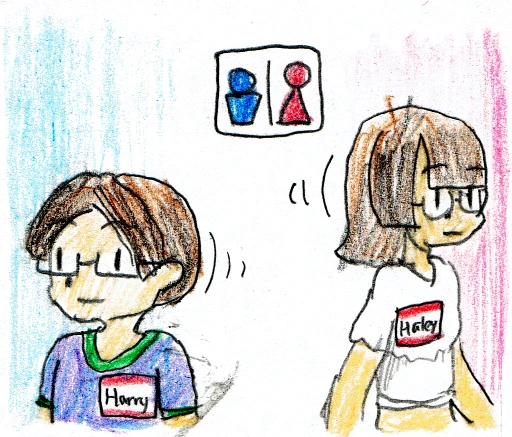
kama (arrive, coming) is used as a preverb to mean “to become”.
As for the language called Nijon, my name is Haruki. It has this air: As for one, as for the time of new plants growing, I started existing. As for two, I am a thing of my female parent’s strong want towards the coming time. This name is a male name and is a female name.
As for the language called Inli, I willingly have the name Harry. Same as the person called Ali Pota (Harry Potter), I use an eye tool on my face. But I come to know my womanliness. Because of this, I don’t want this name.
My new name is Haley in the language called Inli. This is a female name, and sounds similar to my name in the language called Nijon. This is a similar name to the person of entertaining sound of the mouth in the group called Palamo (Paramore), but her way of writing is not the same (She is Hayley Williams, using two “Y”.)
kalama musi (entertaining/frivolous/amusing sound) is the common phrase for “music”. sitelen encompasses writing, drawing, videos, and all other visual imagery.
As for the language called Epelanto, I use Hejli, from the sound of my name in the language called Inli. As for Toki Pona also, I use “jan Eli” (jan [e li .]) from the same method.
Haruki, and Haley, and Hejli, and jan Eli are me. As for communication next to me, all those names have inside one thing; that thing is me.
Here, I am trying to set up a consistent metaphor to use for the coming paragraphs. Words have an “inside”, that contain many “contents”: definitions of those words.
I love language.
Since toki means “speech, language, communication”, this could also be interpreted as “I love blabbering”. Hopefully the picture and the following paragraphs will guide the reader away from that.
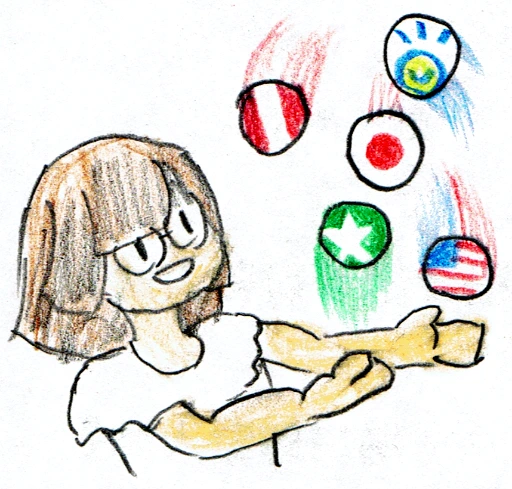
toki pona literally means “good talk” or “simple communication”. As a verb, it could mean “to speak in Toki Pona” or “to speak concisely, or with simple words”.
I use the language called Nijon and the language called Inli from my beginning time. I come to know the language called Epanja in a knowledge house. I come to know the language called Epelanto on the Internet. As for this time, I use all these languages.
I come to know Toki Pona from a person called LangFocus on a document called Jutu. I know much Toki Pona.
...but, as for lots of time leaving, I come to know the name “tonsi”. And I don’t know how to use this name. And you don’t know that also.
Toki Pona uses the word nimi (name) to refer to all words in general. Come to think of it, someone’s name is a word they have all for themselves to refer to them (and to everyone with whom they share their name). In this literal translation, I will keep translating it as “name”.
Side-things are very big in Toki Pona.
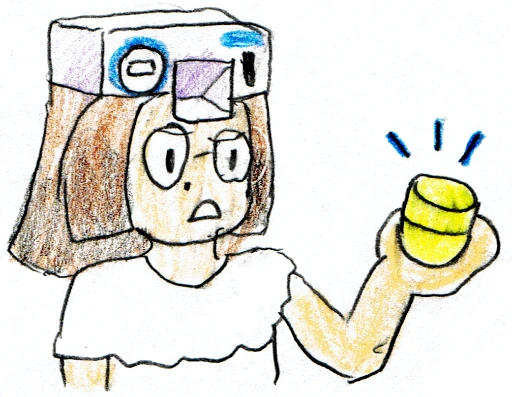
Toki Pona has names of this number: 137. (This number is not the same towards all speakers.) This number is very small towards other languages. One name has many methods to use, and the speaker needs to hunt for a good use.
In the original text, the number is written out in nasin nanpa pona, in which ale (everything) means 100, mute (lots) means 20, luka (hand) means 5, and tu (two) means 2.
Names have the ability for use because of this: they emit the same thing towards someone else. One person talks and pictures something inside their head; as for using names, one person can emit the same thing, feeling, or desire towards a person who is not the same. A name emits something from its person’s head towards the head of a different person.
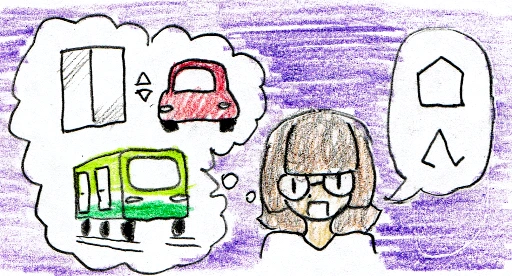 All of them are not the same. But all of them are a “moving house/room”.
All of them are not the same. But all of them are a “moving house/room”.
My speech bubble says tomo tawa, which is the common phrase for a vehicle, but it can apply to anything that is more or less an enclosed structure that can carry a person from one place to another.
As for not using Toki Pona, using Toki Pona is different. Names of this language have a large inside. They contain lots of things.
As for all time, the listener wants to know this: As for this time, the person talks a name towards me; what thing does that name contain? The speaker wants to know this: I want to emit one want towards the listener; will my names emit the same thing towards them?
As for my feelings, this is broken. In the opposite way, but at the same time, this: As for my feelings, this is fun. Along what method can I get rid of this flaw?
What “animal” do you love the biggest amount?
In the original text, I used the Japanese word 動物 without transliterating, to drive home the point that Toki Pona has no one common word for “animal”.
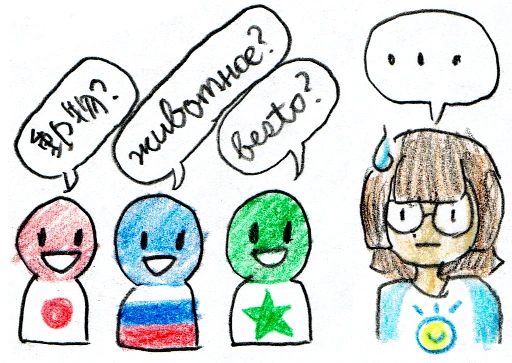
Adding a to a single word turns it into an exclamation. Adding it to pakala (mistake, mess, to break) is the common way to say “Dang it!”.
As for not using Toki Pona, this communication of wanting to know is very simple. [lists examples from 3 languages] This is similar to this: “As for your feelings, what soweli is the best?” But this is not all the same.
soweli is often calqued as “land mammals”, but the distinction is blurry when the animal has no fur.
As for Toki Pona only, this communication of wanting to know, and the communication of knowledge towards that communication, is not possible in Toki Pona. Possibly, they don’t love a soweli the most; possibly, that is a waso, an akesi, a pipi, a kala, something with no name in Toki Pona.
waso encompasses birds and other flying animals. akesi encompasses reptiles, amphibians, and
other slimy or scaly animals. pipi encompasses bugs and other tiny creatures. kala encompasses
fish and other aquatic creatures.
Toki Pona does not have words or set phrases for specific species, except
perhaps akesi linja (line-lizard) for “snake”, and kijetesantakalu for “raccoon, lemur, red panda,
or tanuki”. As the length suggests, this word was an April Fool’s joke and a long-standing community inside
joke.
the language called Losi has the name “слон”. Is this a soweli? Its mother gives out white liquid to its little “слон”. But, its skin has no strings. Have its rope-like nose in your hand; give knowledge of this towards its big ear: is a “слон” a soweli?
I used the Russian word for “elephant” for the same reason I used the Japanese word for “animal”: to make it look and feel like the alien concept to Toki Pona that it is.
Adding the word o at the start of a sentence makes it a request or command.
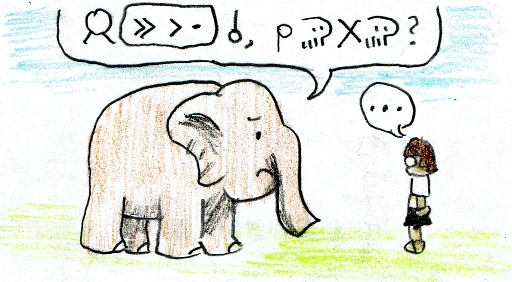
Adding the word o at the end of a name makes it a vocative, meaning you’re addressing or calling for that person.
In Tuki Tiki, the name ka contains this thing, and humans too. People of Toki Pona use this in Toki Pona, but the number of these people is very small.
Tuki Tiki (deriving from toki sike, “repetitive speech”) is an even more minimalist descendant of Toki Pona. It only has 39 words, using 8 phonemes and a maximum of 2 syllables per word.
Possibly, this: I use a document of knowledge of lots of imagery. This document depicts all “soweli”, all “akesi”, all “waso”, and similar. Only in the context of this, I can speak this want to know: “Inside this document, what ijo—thing is best towards you?”
In terms of this communication, I need side-things. Toki Pona alone can’t say this.
The name “tonsi” is broken.
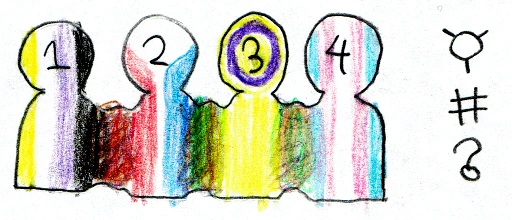 All of them are not the same. But all of them are tonsi.
All of them are not the same. But all of them are tonsi.
The name “tonsi” needs side-things at all times. Lots of times, that side-thing is in another language. Lots of times, that other language is the language called Inli.
As of the document “ku”, the name “tonsi” contains two-and-two things.
ku refers to The Toki Pona Dictionary, Sonja Lang’s documentation of how the community actually used Toki Pona, as of 2021. These definitions are not given in this order in the book.
The first content is this. “Tonsi” is a person, is not a man, and is not a woman. This content is the most important. All people of Toki Pona know and want this content.
The second content is this. “Tonsi” is a man like this: he moves femininely, he talks femininely, and he clothes femininely; on the contrary, he feels masculine. Also, “tonsi” is a woman with much masculinity who feels feminine. As for my feelings, this content is bad and broken. “Tonsi #1” is not a man and not a woman. “Tonsi #2” is a man or a woman. These two people feel bad and compative because of this: a person can’t see their soul.
The first-after-second content is this. “Tonsi” is this kind of person: their body is not all male and not all female. As for my feelings, this is broken along the same path. A person of competitive moving with their legs exists; her name is Kasata Semenja (Caster Semenya). Her body is “Tonsi #2+1”; but the feeling inside her head is this: she is a woman only. She is different; but she too is a woman.
The second-after-second content is this. “Tonsi” is this kind of person: as of the time of leaving their mother, their body is male. But the feeling inside their head is female. Also “tonsi” is a person with a female body in the beginning time, and a male head in the current time. Documents of Toki Pona people say this: This method of use can feel combative towards many people. My feeling is the same. Along this path, I am a woman who’s “tonsi #2+2”. But, as for my feelings, I am not tonsi and I am a woman.
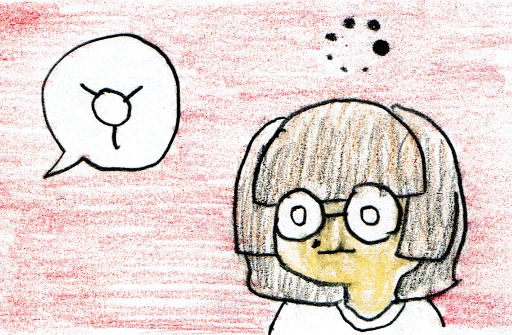 Tonsi? Please wait... What do you want to say?
Tonsi? Please wait... What do you want to say?
Why are the two-and-two of us a group? We are not the same.
Also, this. If a person says the name “tonsi”, I don’t know this: What thing does this word contain?
As for other names, I know their desire. Possibly, my knowledge is not the same as the speaker’s desire. Possibly, my knowledge contains badly many things. But I know something.
As for the name “tonsi”, I don’t know. If a person says the name “tonsi”, I don’t know this: Is it “Tonsi #1”, or “Tonsi #2”, or “Tonsi #2+1”, or “Tonsi #2+2”?
If you remove the name “mije” and the name “meli”, you don’t remove the breakage.
This deliberate disuse of gendered words is called the “gendern’t nasin”.
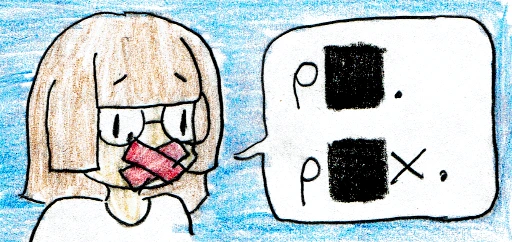
Because of this breakage, many people don’t use the name “mije”, the name “meli”, or the name “tonsi”. This method doesn’t remove the breakage. This only removes the ability to talk about the breakage.
*nasin is a word meaning “road” literally, and “method” figuratively. In this case, it refers to a personal dialect of Toki Pona.
As for the big group of people of Toki Pona, I am a woman and I am “Tonsi #2+2”. In this new method, I can’t say this: I’m a woman. A large slice of me is gone. The ability to talk about my large bad feeling is gone. This method removes my mouth. This method doesn’t want to listen to my desires.
Large groups of people of all lands have men and women. If you remove the names “mije” and “meli” (and possibly “tonsi” too), you remove a very large slice of human feelings.
Are “tonsi women” women?
Toki Pona has two ways of making yes-or-no questions. 1: double the verb and sandwich ala (not) with it. 2: Tack on anu seme? (or what?) at the end.
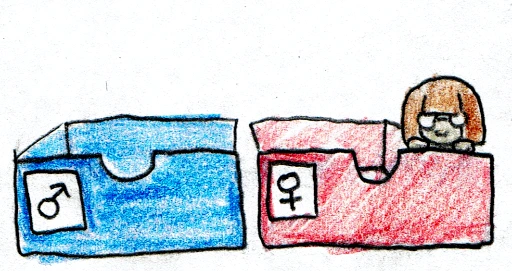
I hear lots of talk about the damaged feelings of “Tonsi #2+2” on the document called Wesi (Reddit). Many of them communicate this feeling: I am a woman/man. I am not tonsi. I’m no different from these women/men: the women/men are women/men in their starting-time. My feelings are the same.
A group of people has only two containers. One container is men. The other consainer is women. Inside my mind, “Tonsi #2+2” men are in the man box, and “Tonsi #2+2” women are in the woman box.
Also, this: Many “Tonsi #2+2” say otherwise. They say this: “I’m a woman/man. I’m also tonsi.” To my eyes, the strength of the bad feelings toward the name “tonsi” of two “Tonsi #2+2” is not the same.
My want is this: We remove “Tonsi #2”, “Tonsi #2+1”, and “Tonsi #2+2” from the name “tonsi”. We talk the same as this: a tonsi is not a man or a woman. But, I also hear this: Many “Tonsi #2+2” don’t want that, and don’t feel the damage of the name “tonsi”.
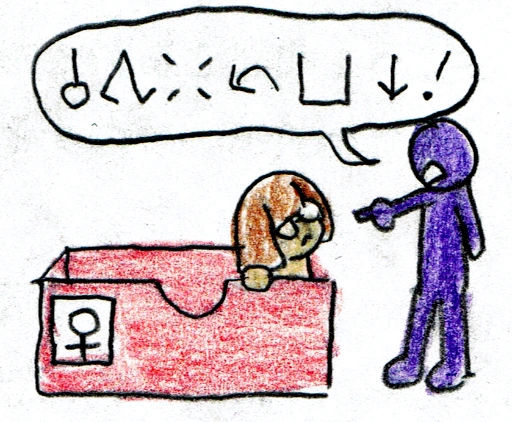
The speech bubble says o tawa weka tan poki ni! (Leave that box!).
Adjacently, the person called Lipamanka (u/misterlipman) gives off bad feelings and combative feelings toward me. They are “Tonsi #1”. They say this: Men of since starting-time are in the man box. Woman of since starting-time are in the woman box. But all “Tonsi #2+2” people are not in the two boxes.
This speech of the person called Lipamanka fights my feelings. At my starting-time, I am a man. But this is important: I am too a woman. I want to be inside the woman box.
In a different way, this too. Many “Tonsi #1” say this: They’re a “tonsi man/woman”, or they’re a “male/female tonsi”. I don’t feel like I know this. Is a tonsi a man or not? Is a tonsi a woman or not?
For little time, I talk untruth. Inside my head, a “tonsi” is not a man or a woman: they’re “Tonsi #1”. On the other hand, “tonsi men” and “tonsi women” are men or women: they’re “Tonsi #2+2”. In this case, I can feel like I understand this.
but, as for truth, this is not the method of use. because of thes, I don’t know the name “tonsi”. Do you know it either?
Along what method do we remove the breakage?
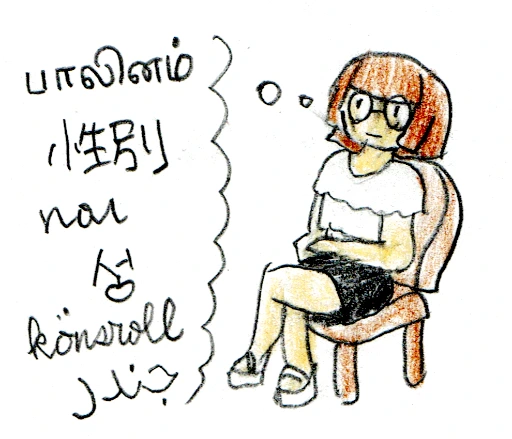
The thought bubble contains the word “gender” in 6 languages.
As for my feelings, Toki Pona doesn’t need the name “tonsi”. But it needs one name for this: According to your knowledge, are you a man, a woman, or something else? In terms of the capabilities of the name “tonsi”, this name is very capable.
I didn’t know this name in the starting time. I talked inside my head. I talked to other people. Since this is finished, I want to emit the name “pete” now.
pete (gender)
When a person or a thing is male, that masculinity is pete. When it is/they are female, that femininity is pete too. When it is/they are tonsi, that tons-ity is pete.
If something is a thing that is pete, it is for men or women or tonsi; possibly, something else is for another pete.
If someone pete-es a person or thing, they communicate or feel this: this is male, female, or tonsi.
Knowledge of use regarding my will
Do not say this regarding pete: “It has two parts; they are man and woman only.” Do not say this either regarding pete: “It has two parts; they are tonsi and un-tonsi only.”
Ways of use
- pete clothes: Pete clothes are clothes of men only, or women only, or tonsi only. If there are many articles of clothing, this: possibly, one article of clothing is for men and another piece of clothing is for women.
- pete water-room: A pete water-room is this kind of water-room: only men or only women can go inside it. A non-pete water-room is this kind of water-room: everyone can go inside it.
- duality of pete: Regarding large groups of people, pete containers exist. One container is men and the other container is women. This existence is “the duality of pete”. These two containers are also “the duality of pete”.
- knowledge-pete: When a person is a man in their feelings and in their head, the masculine feeling and masculine knowledge is a knowledge-pete.When a person is a woman in their feelings and in their head, the feminine feeling is a knowledge-pete as well. When a person is a tonsi in their feelings and in their head, the tonsi feeling is a knowledge-pete.
- pete that is not two: If a person is not inside only one pete container, the person is tonsi. However, this: only in this case, they have a pete that is not two: their knowledge-pete is not two.
- an unusual pete: If one person feels good about their pete that is not two, they can say this: “my pete is unusual.”
- body-pete: Possibly, the body-pete is the pete at the time of the start of their existence. Possibly, the body-pete is the pete on their body according to someone else’s eyes.
- pete badness: If a person emits pete badness to someone else, the person is bad towards them just because of their pete. If a person feels pete badness towards themself, the person feels this: “My knowledge-pete is not the same as my body-pete.”
- a person of non-beginning pete: If a person is a person of non-beginning pete, they know this: people ascribed one pete to them at the time of the start of their existence; however, they are a different pete now. On the other hand, if a person is a person of beginning pete, they know this: this is not true for them.
Originating language of this name
This name is from the language called Posuka [Polish] (płeć /ˈpwɛt͡ɕ/). This name is from the language called Tawi [Thai] also (เพศ phet /pʰeːt̚˥˩/).
Why did I make this name?
- Even if a person doesn’t use the name mije or meli or tonsi, the name pete will enable communication about mije, meli, and tonsi.
- The name pete will enable communication about all people like this: people “manned” or “womanned” them at the time of the start of their existence; however, they are a woman or a man or a tonsi. The name jan tonsi is badly large for this will.
A person can communicate their want to know this: “What’s your lipasa?” A person can then respond with this: “I’m a man.” or “I’m a woman.” or “I’m tonsi”.
I feel this: My coming speech could give off bad feelings towards many tonsis. But I say this: we don’t need the name “tonsi”.
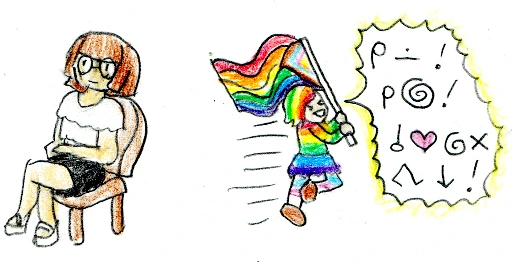
The speech bubble says mi lon! mi nasa! o pilin nasa ala tan ni! (I’m here! I’m nasa! Don’t feel weird about that!).
People can express their lipasa along these methods: “My lipasa is male.” “My lipasa is female.” “My lipasa is different.” I feel this: The lipasa inside many tonsi is breaking the two lipasa boxes; because of this, tonsis could also say this: “my lipasa is nasa.” Being nasa isn’t always bad.
To quote the Sona Pona Wiki, “The semantic space of nasa includes deviations from the norm; that is, thins considered unusual or unexpected. Unlike English, the word holds a neutral connotation by default.”
Also, this is true. Another page on the document called Wesi expressed this want to know: “Using Toki Pona only, are you a man, a woman, or something else?” Responses used the word “nasa”. I hear slightly many of this talk. Many (but not all) “Tonsi #1” people feel and say this: their lipasa is nasa.
My feelings are this: Very possibly, Toki Pona doesn’t need the name “tonsi”. Toki Pona needs a name for the two boxes or neither of these boxes.
Most small-ly, please don’t name me tonsi.
Finishing talk
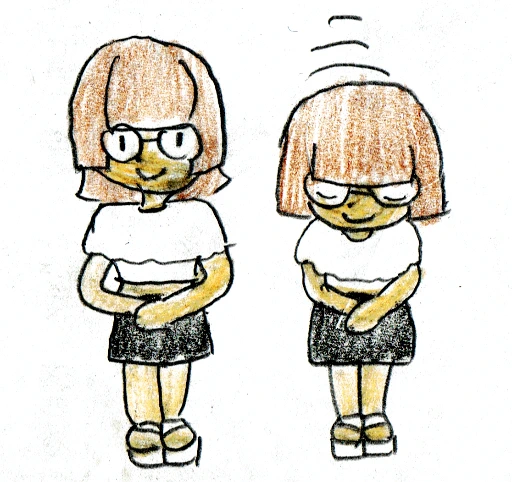
I’m not a person of Toki Pona. In the case that I want to go inside many places of Toki Pona, they stop my movement. Many people of Toki Pona feel this: I am an evil person and I am a combative person. As for my knowledge, nobody will hear my wants. I want to give off liquid from the eye because of this.
At this time, Toki Pona is good to me. But one Toki Pona word is combative towards me. My want is this: I can express the feelings inside my head, using few words in Toki Pona. My want is also this: “Tonsi #1” people can also express the feelings inside their head that are different from “Tonsi #2+2”.
In the case that you heard all of my speech, you are good to me. I feel good because of your listening. May your time be good!
Haley Halcyon @2gd4.me 2025 July 28 9:33
The name `tonsi` is broken.
It makes many different things into one.
People use this name towards other people;
but possibly, other people don’t want that.
Toki Pona needs this name:
People can use this word from their will.
#OPonaEMi #TokiPona #InclusiveLanguage